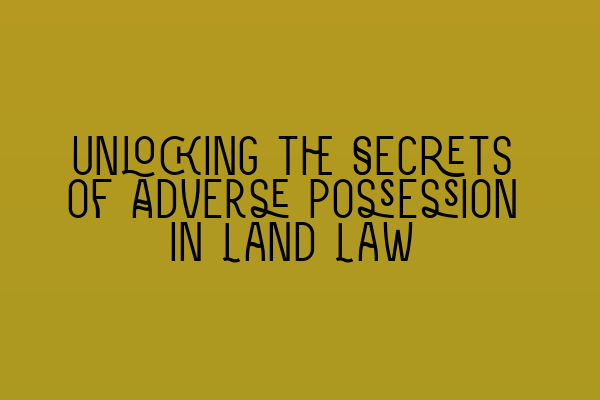Unlocking the Secrets of Adverse Possession in Land Law
Welcome to another informative blog post by SQE Property Law & Land Law! Today, we will be delving into the intriguing world of adverse possession in land law. Buckle up, as we uncover the secrets and shed light on this complex legal concept.
What is Adverse Possession?
Adverse possession refers to the legal principle where a person who is not the original owner of a piece of land can become its lawful owner through continuous and uninterrupted possession for a specified period of time. It is a fascinating area of law that has garnered attention due to its potential for disputes and controversies. Understanding how adverse possession works is crucial for property owners and those involved in land transactions.
Requirements for Adverse Possession:
To establish a successful claim of adverse possession, certain conditions must be met. These requirements typically include:
1. Actual Possession: The claimant must demonstrate that they have physically possessed the land, exercising control and dominion over it. Mere intention to possess is not enough; there must be tangible evidence of occupation.
2. Exclusive Possession: The possession must be exclusive, meaning the claimant exercises sole control and excludes others from the land. Sharing possession with other individuals may hinder a claim for adverse possession.
3. Open and Notorious Possession: The occupation must be visible and obvious. It should put the true owner on notice that their rights to the land are being challenged. Secret or hidden possession will not be sufficient to establish a claim.
4. Continuous Possession: The possession must be continuous for the required period, which varies depending on national legislation. In the United Kingdom, for example, the period is generally 12 years, but it may differ in other jurisdictions.
5. Hostile Possession: The possession must be without the permission or consent of the true owner. The claimant must be treating the land as their own, asserting ownership rights adverse to the rightful owner.
Benefits and Challenges of Adverse Possession:
The concept of adverse possession aims to strike a balance between preserving property rights and rewarding those who have genuinely occupied land for an extended period. It can provide an opportunity for land to be put to productive use, avoiding the wastage of unused parcels. Adverse possession can also be a crucial tool for resolving boundary disputes and filling gaps in property records.
However, adverse possession also raises concerns regarding the security of property ownership and the potential for fraudulent claims. Therefore, it is essential for property owners to be proactive in safeguarding their land and promptly addressing any encroachments or unauthorized occupation.
Adverse Possession in Practice:
The application of adverse possession can vary depending on the jurisdiction and specific circumstances. To better understand this complex area of law, let us consider a hypothetical scenario:
Suppose John has been using a parcel of land adjacent to his property as a garden for 15 years, while the legal owner, Emily, has shown no objection or attempted to reclaim the land during this period. In this case, John may have a viable claim for adverse possession, as he fulfills the necessary requirements of actual, exclusive, open, notorious, continuous, and hostile possession.
However, it is important to note that each case is unique, and the outcome of an adverse possession claim will depend on the specific facts and evidence presented.
Seeking Legal Advice:
If you find yourself involved in a potential adverse possession dispute or wish to gain a better understanding of your rights as a landowner, seeking legal advice from a qualified property solicitor is crucial. They can guide you through the intricacies of adverse possession and provide expert insights tailored to your specific situation.
Conclusion:
Adverse possession is a complex and captivating area of land law. Understanding its intricacies can help property owners protect their rights and navigate disputes. If you have any questions or require legal assistance regarding adverse possession or any other property law matters, do not hesitate to reach out to SQE Property Law & Land Law. Our team of dedicated experts is here to provide you with the guidance and support you need.
Related Articles:
– Understanding Contractual Capacity: Rights and Limitations
– Interactive SQE Mock Tests for Contract Law: Test Your Knowledge
– Join Our SQE Contract Law Webinars: Expert Insights and Guidance
– Contract Law Reforms: An Analysis of Recent Changes
– Parties in a Contract: Rights and Responsibilities
